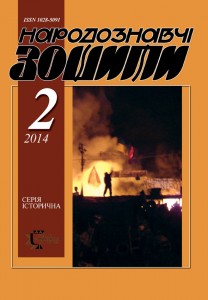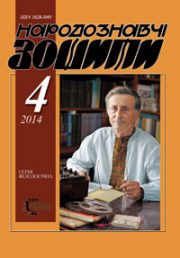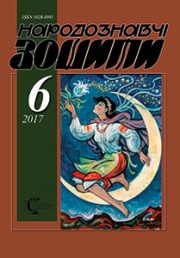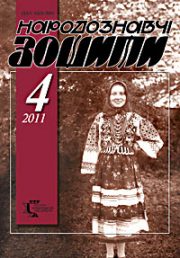
Sapelak Oksana. On guard of Ukrainians’ spirituality. P. 187-192
In the article has been raised a problem of Taras Shevchenko’s role as one of main resources for self-determination of Ukrainian immigrants in Paraguay and Argentina, as a guarantee for affirmation of Ukrainian ethnical groups’ particularity in mentioned countries.
Keywords: immigrants, ethnical group, consolidation, self-defence, self-identification.
read »
Makarchuk Stepan. Taras Shevchenko as an inspirer of liberation struggle of Volynian Ukrainians in the years of german occupation. P. 193-198
The articles has dealt with journalistic reports on celebrating of Shevchenko days in Volhynian periodicals through the first half of the 1940’s. The author has characterized main thematic clusters of articles devoted to Taras Shevchenko in then-a-day newspapers of Rivne («Volyn» and «Orlenia»), Lutsk («Ukra¬yinskyi Holos», «Radianska Volyn»), Zhytomyr («Holos Volyni») and Sokal («Sоkalske Slovo»). Especial attention in the study has been paid to local civil forms of honouring the Poet’s anniversaries, including church commemorative services and poetical festivals.
Keywords: Taras Shevchenko, Volyn, periodicals, occupation, anniversary.
read »
Zheplynsky Bohdan. Shevchenko evenings in Lemko land. P. 199-200
Honoured Worker of Ukrainian Culture, diploma-bearer of Andrei Sheptytski Prize author has presented his childish reminiscences on people’s tribute to Shevchenko’s memory in that part of Lemko land, where his father, Rev. Mykhailo Zheplynsky had been priest.
Keywords: Taras Shevchenko, Shevchenko evenings, Lemko land, school, church yard
read »
Vovkanych Stepan. On communal transformations under conditions of globalization: socio-humanitarian imperatives, non-economic factors and priorities of european integration 201-220
In the article based upon axiological approach to a spectre of vectors for Ukraine’s forthcoming break-through toward lea¬ding civilized positions have been presented some results of study in socio-humanitarian imperatives, non-economic factors and eurointegrative priorities under the context of global challenges and communal transformations.
Keywords: modernization and structural policy, socio-humanitarian notion of development and conciliarism of Ukraine, non-economic factors, Ukrainian national idea, sources and motive forces of public transformations.
read »
Chmelyk Roman. Borderland as a notion under the context of Ukrainian and Polish research-works in ethnical territories. P. 221-228
In the article has been performed an analysis in functioning of notion of borderland in Ukrainian and Polish informational and scientific literature. Problems in usage of adjacent terms as frontier, frontier belt, frontier zone in ethnological science have also been considered under the context of studies in borderland as social phenomenon of adjacent ethnical territories.
Keywords: borderland, frontier, frontier zone, frontier belt, ethnical territory.
read »
Hlushko Mykhaylo. On auxiliary household activities of Stary Sambir population. P. 229-235
In the article have been considered some modes of work and technical means used at traditional auxiliary activities, as fishing and hunting, during late XIX through XX cc. along the territories of present-day Stary Sambir region, the southern parts of which belong to ethnographic Boiko land and northern areas of San riverside. The study has been based upon field ethnographic materials.
Keywords: ethnology, traditional fishing, hunting, methods and means of work, Boiko land, San riverside.
read »
Movna Ulana. Wax candle as ukrainian Christmas and Epiphany ritualistic text. P. 236-249
For the first time in native ethnology the article has brought some results of special study in sign functionality of a wax candle under the context of Ukrainian Christmas and Epiphany ritualistic text (ritualism of Christmas Eve, New Year, Epiphany Eve and Feast of Epiphany). The study has stated extremely high semiotic position of a wax candle as projection of Sun, mediator between the spheres of sacral and prophane elements, symbolic analogue of human existence, apotropy, cultural symbol re-establishing borders of acculturated space.
Keywords: wax candle, Christmas, Epiphany, ritualistic text, Ukrainian.
read »
Zyubrovsky Andrii. Daily bread baking of ukrainians in the Suth-Western ethnographical region at the late XIX to early XXI cc. P. 250-263
The paper has dealt with analytic study in prescriptions, signs, customs, methods, ways of selection, procurement and some peculiarities in usage of subsidiary means — water, firewood and leaves in bread baking. The final aim of the mentioned actions had been (and still is) selection of the means and ingredients fit, by their characteristics, for the backing of bread. The paper has demonstrated dependence of bread backing subsi¬diary means criteria from the folk nutritional standards and world outlook stereotypes as well as from regional social and economic, natural and geographical factors and peculiarities of material culture.
Keywords: water, divinations, firewood, whirlwind, thunder, inhumation, stove, leaves of trees and vegetables, bread.
read »
Pukivskyy Yuriy. Navskyy Velykden’ — «easter of the dead»: traditional customs and beliefs (based on the materials from historical-ethnographic region of Volyn’). P. 264-269
Paper deals with the analysis of traditions of celebrating folk calendar archaic festival — Navskyy Velykden’ in Volyn’. Funeral customs and rituals relating to this day (visiting graves of their relatives, bringing the graves consecrated food, ritual meal at home, symbolizing the dead Fitr) researched. Also, the tradition of respect for a number of taboos and their motivation described. Among others, the distinctive local features of the celebration in the territory of historical-ethnographic Volyn’ despite its all-character.
Keywords: Easter, commemoration, dead ancestors, customs, beliefs, taboos, historical-ethnographic Volyn’.
read »
Radovych Roman. Polisian stove: some features in formation of external arrangement. P. 270-291
One of the most important problems connected with a heating system of Polisian dwellings has been examined in the article. Author’s attention in particular has been paid to formation of constructive peculiarities of traditional stove, techniques and technolo¬gies of building processes, main materials, choice of optimal dimensions in components, structure of working surfaces etc.
Keywords: Polisia, traditional stove, construction, components.
read »
Horbal Maria. On the sources of Christmas ritualism in Lemko land. P. 292-298
The article has brought proofs of the statement that the sources of Christmas ritualism in Lemko land had been rooted in people’s spirituality and folk cultural basis. Numerous examples have presented the extension of spiritual tradition since ancient times up to present days
Keywords: paganism, Christianity, Old Testament, New Testament.
read »
Makarchuk Stepan. On ethnographers of Ukrainian State Museums of Ethnography and Artistic Crafts at Lviv in 959—1965 (reminiscences, archive materials). P. 299-309
The article has brought some historical information on staff ethnographers of USMEAC at Lviv in the late 1950s and the first half of 1960s, their scientific interests, research-works and achievements, their part in social life of Lviv and Ukraine. In authorial view have been presented various personal political, working and psychological traits of leading native ethnographers of the mentioned period —- Yu. Hoshko, K. Mateyko, D. Figol, M. Kozakevych, M. Kovalsky, L. Sukha, M. Lomova, V. Malanchuk and others.
Keywords: ethnography, culture, family life, ethnographic studies, expeditions, visiting conferences and exhibitions.
read »
Pavlukh Mariya. On feminine movement in Galicia and eminent ukrainian women. P. 310-312
The article has presented some results of a research-work on Western Ukrainian feminine movement and its corrrelations with feminine movements of Europe. All principal stages of feminine movements have been described. Under analytic study have been put almanacs edited by N. Kobrynska as well as anthologies and first attempts of feminint press in Galicia. Descriptions and historical evidences of labours by eminent Ukrainian women has been exposed.
Keywords: feminine movement, emancipation, feminine periodicals.
read »
Taras Yaroslav. On Bessarabian and Moldavian Ukrainians in the studies of historical ethnography. P. 313-319
The article has thrown some light upon a sum of scientific findings got during XIX to XXI cc. in historio-ethnographic studies of Bessarabia and Moldavian Ukrainians. In the pre¬sent paper has been given author’s answer to the problem of lacking progress as for the numerous themes concerning Ukrainians. State and achievements of the research-works in Ukrainians’ material and spiritual culture by the scientists of Moldavia and Ukraine through the years of independence has been exposed.
Keywords: Ukrainians, ethnography, Moldavia, Bessarabia.
read »
Luta Ivanna. Maternity ritualism by Volhynians in publications of the second half XIX to the early XXI cc. P. 320-327
In the article have been considered some basic landmarks for fixing and publication of ethnographic materials on the maternity rites of Volhynia with analytical study in ritual elements, their kinds and territories of origin. The article has also raised a problem of gaps in studies of maternity rites of Ukrainian historio-ethnographic Volhynia.
Keywords: ethnology, historio-ethnographic Volhynia, maternity ritual, historiography.
read »
Kotsan Vasyl. Traditional folk clothes of Velikobychkovsky Hutsuly of XIX — the first half of XX century. P. 328-343
In the study based upon numerous field materials, literature sources as well as ethnographic, historio-cultural and regional museum collections has been performed complex analysis in traditional folk clothes by Hutzul population of Velyky Bychkiv village in Transcarpathian region. Detailed descriptions of femi¬nine and masculine clothing complexes of the mentioned area have been presented. In characterizing of those main attention has been paid to the detail of cut in separate components of dress; cut of feminine shirt has been added as an illustration.
Keywords: clothes, Hutzuls, Velyky Bychkiv, shirt, cut, cap, leather sandals, boots, bag.
read »
Kruchynenko Vyacheslav. On marital structure by population of Myrhorod regiment in the 2nd half of XVIII c. P. 344-349
In the article based upon the records of General description (1765—1769) has been presented historio-demographic analytic research-work in marital structure by population of Myrhorod regiment.
Keywords: historical demography, General description, marital status.
read »
Voloshyn Marianna. On ethnographic thematics in Danylo Figol’s scientific practices. P. 350-360
The article has been devoted to less-known figure of Ukrainian ethnology — Danylo Ivanovych Figol, ethnologist, museum employee, photographer and lawyer, whose fate was narrowly linked with Galicia. Light has been thrown upon the resear¬cher’s worldview formation and personal development as well as his ethnographic and museum activities. Especial attention has been paid to Danylo Figol’s role in the progress of ethnogra¬phic studies of 1940s—1950s in Lviv. Analytical review of the scholar’s main concepts exposed in his publications and manuscripts has made this person more understandable to the pre¬sent-day readers. The study carried out analysis of key scientific works ethnologist. Source base of Danylo Figol’s works has convinced Ukrainian scientific community in high value and importance of his notions, conceptions and conclusions for science of XX c.
Keywords: Danylo Figol, State Museum of Ethnography of USSR Academy of Sciences, Ethnography Department of Institute of Ukrainian folklore of USSR Academy of Sciences, ethnology, Galicia, UFOTO.
read »
Movna Marianna. On Lviv guide-books of soviet period. P. 361-365
The article has presented an attempt of historical review in Lviv guide-books appeared at the Soviet period. The study has brought a kind of guide-book typology with definition of considered themes and subjects; ideological and linguistic determinations of the Soviet regime have been explained. The author’s achievements in the field of Lviv historical regional studies have been characterized.
Keywords: guide-books, Lviv, history, Ukrainian SSR, tourism.
read »
Dubyk Yuri. Beatific Nicholas Charnetsky wooden church of Lviv and constructive history of the temple. P. 366-372
In the article has been presented concise history of realizing the idea of sacral complex raised up in Pidholosko street at the town of Lviv (on the former territory of Lviv suburb Holosko) with top-priorited edifice of wooden church, analyses in design decisions as for its location, selection of a prototype, planning of spacial structure, construction, architecture of facades.
Keywords: Lviv, wooden church, cross-shaped planning structure.
read »
Vojtovych Nadiya. Boikos’ pandemonium: categories of evil deceased (after field materials). P. 373-380
In the article have been presented some research-work on peculiarities of Boikos’ traditional demonological notions as for so-called evil deceased; on the basis of field records and ethnological literary sources quite a number of scum categories have been defined as well as essential habits, modes of behavior and functions of these personages of people’s demonology.
Keywords: evil deceased, people’s demonology, demonological notions, Boikos.
read »
Nyemyets Viktor. Wedding ranks in a structure of traditional bridal ritual by Bukovine Hutzuls (after expeditionary from Putyla of Chernivtsi region). P. 381-385
The paper based on field ethnographic data and literary sources has presented an analysis in personal contents of traditional wedding among Bukovine Hutzuls. Wedding ranks have been consi¬dered by the author according to such options as gender, age, marital status, degree of relationship, appurtenance to marital parties and ritual functions. Classification of wedding ranks by Bukovine Hutzuls according to guests’ functional duties has been added.
Keywords: wedding, ranks, gender, age, marital status, degree of relationship, appurtenance to marital parties, ritual functions.
read »
Hodovanska Oksana. On traditional vegetable growing and gardening in Cherkasy (after field expeditions in Korsun-Shevchenkiv and Kaniv areas). P. 386-391
Climatic conditions are rather favorable for the progress in vegetable growing and gardening of Cherkasy region. In structure of traditional Ukrainian economy vegetable growing and gardening had quite a significant role. Vegetable growing and gardening in Cherkasy region have a lot of local features. Traditional vegetable growing and gardening have undergone substantial transformations in the course of ХІХ and ХХ cc. These changes have consisted in rapid transition from traditional home auxiliary production to market-predestined agricultural industry.
Keywords: gardening, vegetable growing, Ukrainian, economy, market sector.
read »
Konopka Volodymyr. Volhynian people’s calendar (after materials from the villages of Vilhir and Kolesnyky in Hoshcha region of Rivne obl.). P. 392-402
In the article based on materials from two villages, those of Vilhir and Kolesnyky, has been described calendar ritualism of Volhynia. Customs and rites have been recorded by pupils of the local school. This publication covers description of customs and rites performed around the year as well as folklore texts that accompanied those.
Keywords: Volhynia, calendar, ritual, custom.
read »
Holubets’ Halyna. Exhibitions at the Museum of ethnography and artistic crafts, the Ethnography institute of NAS of Ukraine in 2013. P. 403-415
The article has thrown light upon exhibitive activities that during 2013 took place at the Museum of ethnography and artistic crafts, a department of the Ethnology institute of NAS of Ukraine. In the course of the year has been demonstrated an exhibition of porcelain collections from the museum stores as well as organized several presentations of native and foreign folk and professional decorative applied art, shown creations of painting, graphical art, sculpture, artistic photography, posters, works by the students of art schools and institutions.
Keywords: Museum of ethnography and artistic crafts of the Ethnology institute of NASU, exhibitions, 2013.
read »
Mykhailo Hlushko. Jubilee collection of scientific works by patriarch of Ukrainian ethnology. P. 416-418
read »
Stepan Stoyko, Yuri Nesteruk. Polish scientists’ fruitful co-operation in the context of rural ecumena’s constant development. P. 419-421
read »
Oksana Kis’. History of Ukraine in the mirrors of women destinies. P. 422-425
read »
Roman Yatsiv. Some pages from the history of Zaklynskys family. P. 426-428
read »







